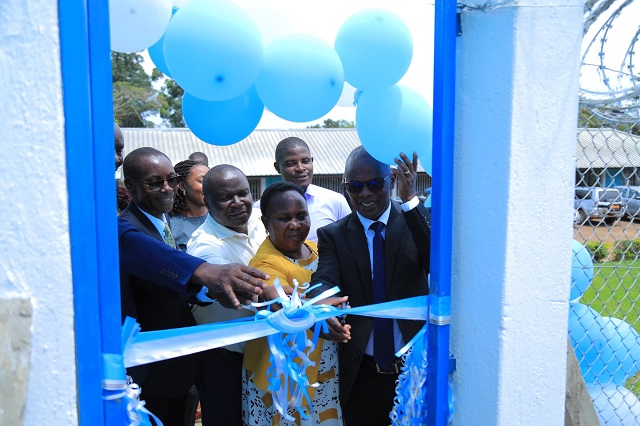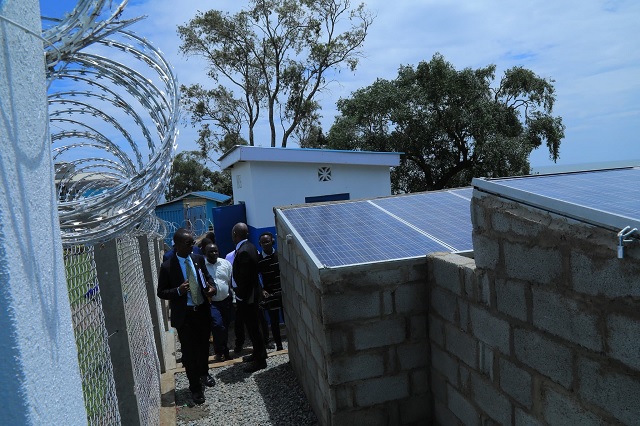
Wakiso, Uganda | THE INDEPENDENT | The Fisheries Training Institute (FTI) has installed a solar lighting and water pumping system to address unsustainable running costs the institution has been incurring.
The system, part of a shs 600 million project was commissioned today by the ministry of Agriculture, Animal Industry and Fisheries (MAAIF) undersecretary Mr Ronald Gyagenda who represented the Permanent Secretary Maj. Gen David Kasura Kyomukama.
Gyagenda who commended the institution’s leadership for putting project funds to good use also asked them to be more creative to generate own resources for self-sustenance or else risk the institution’s vast land being committed to other use by the authorities.
Principal Willy Ofwono Osinde said the commissioned solar system would help the institute save shs 3.6million and shs 3million respectively the institution has been spending monthly on water and power bills.
Project manager Eng. Kyeyune Isaac explained that the water system that depended on ground water had capacity to pump up to 33,000 a day and automatically switches off when the reservoir fills.
The lighting for the administration blocks and class rooms had also been solved to enable studies and other work progress without fear of outages, Kyeyune explained.

The institute has a total of 260 students with 120 of those being government sponsored while the rest are private students. Gyagenda dismissed the principal, Osinde’s plea for more funding based on food, water and other non-scholarly requirements, which he said are not essentials.
He urged the institute’s leadership to concentrate on scholarly essentials and emulate Makerere University by leaving the “non-essentials” to the private sector to handle.
“You have to creatively find ways of generating you own resources. Otherwise how will you navigate the argument that an investor has come and we need to put this land to better use?” Gyagenda mused.
He said government had prioritized the fisheries sector, revitalizing the institute’s mission of training fisheries experts. If it required getting private partners to get resources to run the institute, be it, Gyagenda said cautioning that any such investors must not be those whose activities deviate from FTI’s core mission.
The undersecretary said the fear of students rioting over feeding should not arise because food is not a core of the institution. “MUK after a lot of time abandoned feeding students. Cooking beans and posho does not require a lot of skills. Leave that to the private sector and concentrate on your core mission…. If what you are planning is to make them (students) better, then make them understand.”
FTI Governing Council chairman Dr. Godfrey Kawooya Kubiriza lamented that many of the institute machinery and equipment were obsolete and require replacement, having been installed in the 1960s. “We need modern technology to move with the times,” he said.
He disclosed the institute was contemplating starting course in boat /vessel building, an idea Gyagenda supported as a step in creating jobs for unemployed youths, a ticking time bomb.
He complained about government institutions spending money to invest in fisheries ventures instead of partnering with FTI, an already existing infrastructure.
In his opening remarks Principal Ofwono Osinde explained that as part of the shs 600 million, the institute had revamped its curriculum and also mapped out institutions for students’ internship.
He said copies of the revamped curriculum for diploma and certificates in fishing technology and aquaculture had been submitted to the Curriculum Development Centre (CDC) for approval, a move the undersecretary commended in light of media reports that the National Council for Higher Education (NCHE) had condemned several courses at a number of tertiary institutions as being outdated.
He pleaded for funding to repair the dilapidated institution infrastructure, including staff houses, classrooms and student hostels. He also pleaded for government assistance to enable the institute open up subsidiary skills development centres across the country to empower more youths with skills.
********
URN
 The Independent Uganda: You get the Truth we Pay the Price
The Independent Uganda: You get the Truth we Pay the Price



